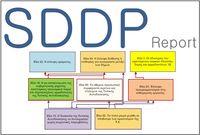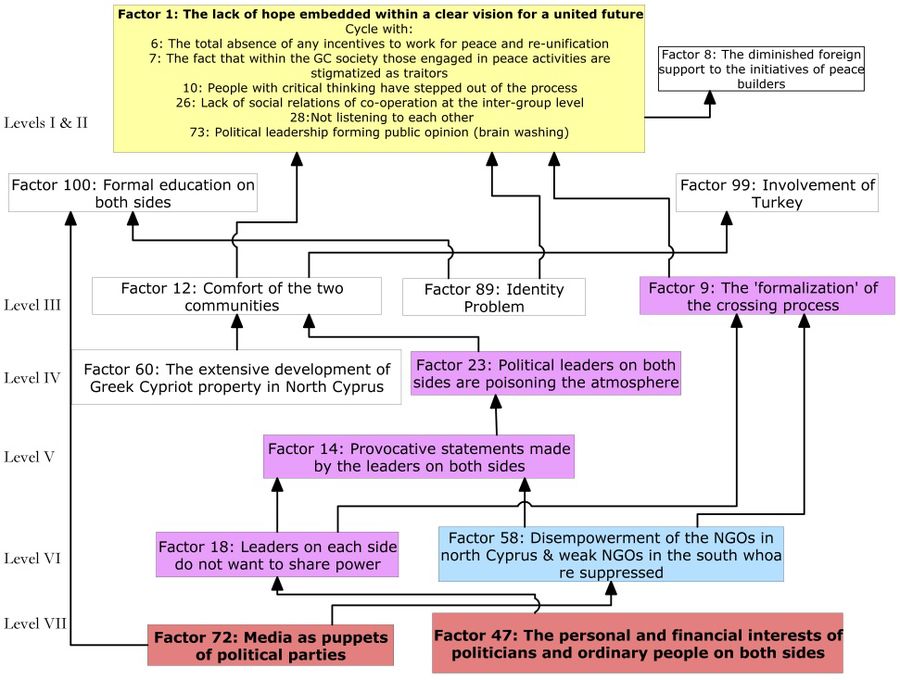SDDP Civil Society Dialogue Obstacles: Difference between revisions
No edit summary |
(change of template) |
||
| (13 intermediate revisions by 8 users not shown) | |||
| Line 1: | Line 1: | ||
{{SDD_Report | {{SDD_Report | ||
|acronym=SDDP Civil Society Dialogue - Obstacles | |acronym= SDDP Civil Society Dialogue - Obstacles | ||
|book_image=SDDP_Report_Image.jpg | |book_image= SDDP_Report_Image.jpg | ||
|report_title= A Systemic Evaluation of the State of Affairs Following the Negative Outcome of the Referendum in Cyprus Using the Structured Dialogic Design Process | |||
|Triggering_Question=What factors contribute to the increasing gap between the two communities in Cyprus? | |project= [[Civil Society Dialogue]] | ||
|Triggering_Question= What factors contribute to the increasing gap between the two communities in Cyprus? | |||
|location= | |||
|dates=September December 2006 | |||
|LeadFacilitator= [[Yiannis Laouris]]<br> [[Marios Michaelides]]<br>[[Aleco Christakis]] | |||
|AsFacilitator= [[Ilke Dagli]] | |||
|author= [[Yiannis Laouris]] <br> [[Marios Michaelides]] <br>[[Mustafa Damdelen]]<br> [[Romina Laouri]] <br>[[Derya Beyatli]] <br> [[Aleco Christakis]] | |||
|editor= | |||
|total_duration= 218 person hrs | |||
|stats= Participants=22 <br>Number of ideas=120 <br>Number of Clusters=20 <br> Ideas received Votes=60 <br> Ideas on MAP R=20 <br>Spreathink ST=50% <br>Situational Complexity SCI=22,9 | |||
|isbn= | |||
|link= [http://socialsystems.wikispaces.com/file/view/Laouris+Cyprus+Referendum.pdf Download Open Access] | |||
}} | }} | ||
==Executive Summary== | ==Executive Summary== | ||
This paper reports the results of the first of a series of co-laboratories organized by Cypriot peace pioneers 30 months after the negative outcome of the referendum concerning UN General Secretary’s plan for reunification of the island. The purpose of this Co-Laboratory was to support a diverse group of disengaged and disappointed peace pioneers and activists representing Turkish and Greek communities of Cyprus develop a shared understanding of factors contributing to the perceived widening of the gap between the two divided communities in Cyprus. The co-laboratory was organized using the structured dialogic design process (SDDP) approach within the context of a rich web-based communication | |||
environment. The root causes contributing to the widening of the gap are discussed and are also compared with those identified during a similar co-laboratory employing the Interactive Management methodology 12 years earlier. | |||
<u>The [[Triggering Question]] (TQ) was </u><br> | |||
'''What factors contribute to the increasing gap between the two communities in Cyprus?''' | |||
In response to the TQ, the 22 participants came up with 120 obstacles, which were categorized in 20 clusters. Following the voting process, 47 ideas received one or more votes and were structured to create the influence MAP shown below. <br> | |||
<br> | <br> | ||
[[File:CivilSocietyDialogue_MAP_Obstacles.jpg|thumb|center|upright=3.0|alt=Influence tree from the Obstacles SDDP of the Civil Society Dialogue co-Laboratory.|Influence tree from the Obstacles SDDP of the Civil Society Dialogue co-Laboratory.]] | |||
<br> | |||
According to the participants of this Co-Laboratory, appear to be the most influential were: <br> | |||
* Obstacle #72, Media as puppets of political parties <br> | |||
* Obstacle #47, The personal and financial interests of politicians and ordinary people on both sides <br> | |||
The Co-Laboratory was facilitated by [[Aleco Christakis]], [[Yiannis Laouris]], [[Marios Michaelides]], [[Mustafa Damdalen]], [[Romina Laouri]] and [[Derya Beyatli]]. The Co-Laboratory was also attended by 24 Cypriots participants and 2 American scholars who spent about a year on the island working on their Masters theses. | |||
In sum, the participants of the dialogue reported their satisfaction that their voices have been heard and documented and communicated their expectations for follow-up activities to address the diagnosis of their needs.<br> | |||
The full paper can be downloaded from [http://socialsystems.wikispaces.com/file/view/Laouris+Cyprus+Referendum.pdf| Open Access].<br> | |||
==Sponsor and partners== | ==Sponsor and partners== | ||
The initiative which eventually led to the birth of the Civil Society Dialogue project was inspired by a team of six veteran peace pioneers, who decided to meet (physically) in September 2006 to discuss the post-referendum political situation in Cyprus and explore possibilities to revive their dream for a reunited island. These six pioneers were members of the peace group, widely known as [[Cyprus Conflict Resolution Trainers Group]] (CRTG), which in the years between 1994 and 1997 managed to inspire and mobilize a few thousand Cypriots to work for peace and reconciliation. | The initiative which eventually led to the birth of the Civil Society Dialogue project was inspired by a team of six veteran peace pioneers, who decided to meet (physically) in September 2006 to discuss the post-referendum political situation in Cyprus and explore possibilities to revive their dream for a reunited island. These six pioneers were members of the peace group, widely known as [[Cyprus Conflict Resolution Trainers Group]] (CRTG), which in the years between 1994 and 1997 managed to inspire and mobilize a few thousand Cypriots to work for peace and reconciliation. | ||
==External Links== | ==External Links== | ||
* [http:// | * [http://blogora.wetpaint.com/page/Cyprus+Civil+Society+Dialogue?t=anon| Visit the wiki of the Civil Society Dialogue project here] | ||
* [http://www. | * [http://www.civilsocietydialogue.info/| Visit the website of the Civil Society Dialogue project here] | ||
* [http:// | * [http://socialsystems.wikispaces.com/file/view/Laouris+Cyprus+Referendum.pdf| Download the full paper here] | ||
| Line 53: | Line 61: | ||
[[Category:SDDP (Peace)]] | [[Category:SDDP (Peace)]] | ||
[[Category:SDDP (Society)]] | |||
[[Category:SDDP (Civil Society Dialogue)]] | |||
[[Category: SDDP Reports]] | |||
Latest revision as of 06:12, 22 July 2022
|
Executive Summary
This paper reports the results of the first of a series of co-laboratories organized by Cypriot peace pioneers 30 months after the negative outcome of the referendum concerning UN General Secretary’s plan for reunification of the island. The purpose of this Co-Laboratory was to support a diverse group of disengaged and disappointed peace pioneers and activists representing Turkish and Greek communities of Cyprus develop a shared understanding of factors contributing to the perceived widening of the gap between the two divided communities in Cyprus. The co-laboratory was organized using the structured dialogic design process (SDDP) approach within the context of a rich web-based communication environment. The root causes contributing to the widening of the gap are discussed and are also compared with those identified during a similar co-laboratory employing the Interactive Management methodology 12 years earlier.
The Triggering Question (TQ) was
What factors contribute to the increasing gap between the two communities in Cyprus?
In response to the TQ, the 22 participants came up with 120 obstacles, which were categorized in 20 clusters. Following the voting process, 47 ideas received one or more votes and were structured to create the influence MAP shown below.
According to the participants of this Co-Laboratory, appear to be the most influential were:
- Obstacle #72, Media as puppets of political parties
- Obstacle #47, The personal and financial interests of politicians and ordinary people on both sides
The Co-Laboratory was facilitated by Aleco Christakis, Yiannis Laouris, Marios Michaelides, Mustafa Damdalen, Romina Laouri and Derya Beyatli. The Co-Laboratory was also attended by 24 Cypriots participants and 2 American scholars who spent about a year on the island working on their Masters theses.
In sum, the participants of the dialogue reported their satisfaction that their voices have been heard and documented and communicated their expectations for follow-up activities to address the diagnosis of their needs.
The full paper can be downloaded from Open Access.
Sponsor and partners
The initiative which eventually led to the birth of the Civil Society Dialogue project was inspired by a team of six veteran peace pioneers, who decided to meet (physically) in September 2006 to discuss the post-referendum political situation in Cyprus and explore possibilities to revive their dream for a reunited island. These six pioneers were members of the peace group, widely known as Cyprus Conflict Resolution Trainers Group (CRTG), which in the years between 1994 and 1997 managed to inspire and mobilize a few thousand Cypriots to work for peace and reconciliation.
External Links
- Visit the wiki of the Civil Society Dialogue project here
- Visit the website of the Civil Society Dialogue project here
- Download the full paper here

